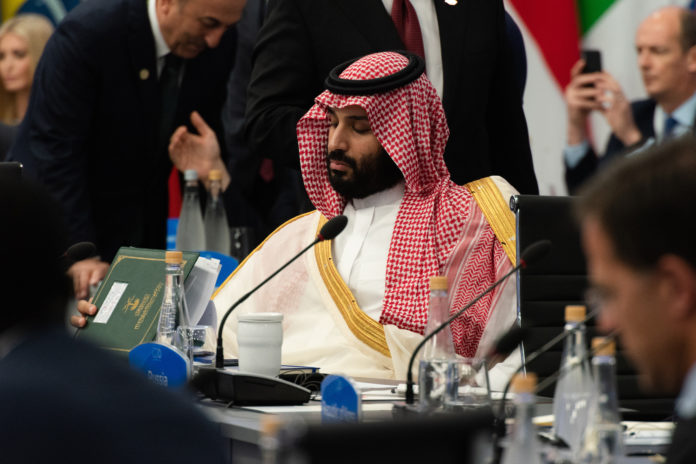Veteran Arab journalist Abdel Bari Atwan says that Saudi Arabia’s trade war on Turkey is all about competing for the leadership of the Sunni Muslim world.
Just after the second anniversary of the killing of journalist Jamal Khashoggi, the Saudi authorities have effectively declared a trade war against Turkey.
On Sunday, the chairman of the Saudi Council of Chambers of Commerce and Industry, Ajlan al-Ajlan, declared that Saudi businesses and consumers had a responsibility to “boycott everything Turkish, whether… imports, investment or tourism,” due to “the Turkish government’s continuing hostility to our leadership, country and citizens.”
Saudi Arabia’s political and commercial relations with Turkey have been steadily deteriorating. They had their golden age a decade ago when the two countries’ interests met over the Syrian crisis.
They worked together closely to mobilise and fund armed groups in the hope of securing the overthrow of the Syrian regime. But a chill later set in which turned into a virtual break-up after Saudi intelligence agents brutally murdered and dismembered Khashoggi at the Saudi consulate in Istanbul in October 2018.
Sunni world leadership
There are several reasons why tensions have burst into the open after the gradual worsening of relations over the past five years or so.
Subscribe to our newsletter and stay updated on the latest news and updates from around the Muslim world!
The major underlying factor is the two countries’ rivalry for leadership of the Islamic (and specifically Sunni) world. Turkey has scored major successes in this regard, not least when it engineered the formation of a new Islamic bloc including Pakistan, Malaysia, Indonesia, Iran and Qatar but excluding Saudi Arabia. This was seen as a prelude to the creation of a rival to the Islamic Cooperation Organisation (ICO), which is based in Jeddah and whose every move is controlled by Saudi Arabia.
The Turkish authorities used Khashoggi’s killing to great effect to undermine Saudi Arabia’s image in the Islamic world and globally. Just days ago, it leaked yet more damaging information about the crime, releasing images of the kiln and well at the Saudi consul’s residence that were used to incinerate and dispose of the slain journalist’s body parts.
Riyadh was also infuriated that Istanbul become a headquarters for various Saudi, Egyptian and Gulf opposition groups, which were allowed to establish satellite TV stations and social media platforms. The Turkish and Saudi authorities have both closed down access to media outlets operated by the other side.
The Saudi trade war against Turkey does not have official status, so as to avoid possible legal action and sanctions by the World Trade Organisation (WTO). Instead, the authorities got Ajlan to demand that members of the business associations he heads stop buying Turkish goods. Few would dare not heed his appeal.
This move will have a negative impact on the Turkish economy at a time when it faces enormous difficulties. Bilateral trade is valued at around $5 billion annually, and Turkey is the number one destination for wealthy Saudi tourists and real estate investors. Saudi Arabia is Turkey’s 15th largest export market, buying around one billion dollars worth of fabrics, steel, chemicals and grains since the beginning of this year.
Saudi Arabia has already been impeding the importation of Turkish goods. One Saudi businessman quoted by Reuters said customs authorities held up containers of supplies he had bought from Turkey for three months before releasing them, and then advised him not to import more products from Turkey if he wanted them to be cleared quickly.
Media war
The media war between Saudi Arabia and Turkey is also widely expected to escalate in the months to come, especially with the two sides parting ways over Syria.
Saudi Arabia has been trying to mend fences with the Syrian authorities. It recently authorised Syrian lorries and produce to transit Saudi border crossings without delay, and is now reportedly backing anti-Turkish Kurdish separatists in northern Syria.
One pro-government Syrian tweeter predicted the Saudi embassy in embassy in Damascus would reopen within weeks, and the two countries would join the UAE and Egypt in an alliance against Turkey and its allies – especially the Muslim Brotherhood.
So the Turkish government is now fighting on three fronts simultaneously: in Syria, Libya and latterly the Azeri-Armenian war. If these four countries join forces against it they could cause it serious difficulties.
On the other hand, standing up against them could enhance Turkey’s standing and popularity in the Islamic world. That includes sections of the populations of the four countries themselves, a worrying prospect for their governments, at least for now.
This article first appeared in raialyoum.


















